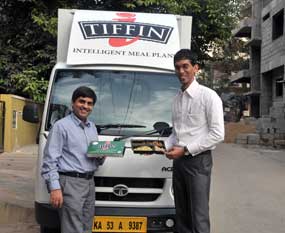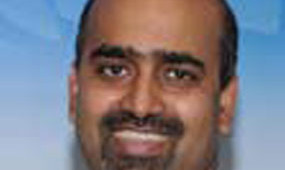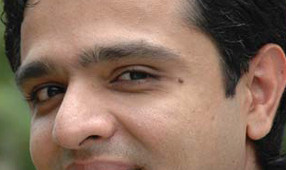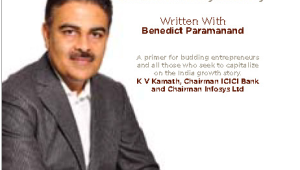 Tapan Kumar Das, 38, is a serial entrepreneur who seems to thrive on starting innovation-driven businesses. A chartered accountant and an IIM Ahmedabad grad, he’s been part of start-ups such as Indian Terrain apparel brand, YLG saloon chain, FlipKart as it’s first CFO, and is now trying his hand in food business. He wants to be the first to deliver scientifically-designed healthy and tasty meals at the customer doorstep in the metros where people increasingly have less time to cook or the cooks are too expensive. Tapan chats with Benedict Paramanand about how he is dreaming big with this venture. He expects his expertise in logistics and finance to make his new venture feed two percent of the population in metros in three to five years.
Tapan Kumar Das, 38, is a serial entrepreneur who seems to thrive on starting innovation-driven businesses. A chartered accountant and an IIM Ahmedabad grad, he’s been part of start-ups such as Indian Terrain apparel brand, YLG saloon chain, FlipKart as it’s first CFO, and is now trying his hand in food business. He wants to be the first to deliver scientifically-designed healthy and tasty meals at the customer doorstep in the metros where people increasingly have less time to cook or the cooks are too expensive. Tapan chats with Benedict Paramanand about how he is dreaming big with this venture. He expects his expertise in logistics and finance to make his new venture feed two percent of the population in metros in three to five years.
What was your inspiration to start the diet meal business?
After I left Flipkart as its CFO in 2011, I was hungry to do something different. One afternoon, while having my lunch, I remembered how we used to have healthy and tasty food during my younger days in my village in Jayapur (Ganjam, Orissa State). The question that sparked in my mind was – can I offer this same quality and taste to people in a city?
In 2011, we started a new venture called Qua nutrition. It was offering nutrition counseling, diet plans, with the aim of changing the eating behavior. One of our customers was the flamboyant cricketer Robin Uthappa. While chatting one day, he cribbed about how he found it difficult to get his food cooked according to his diet plan. That was my Eureka Moment. It was more than that. A potential investor was standing right in front of me and I took the chance to pop the idea of whether he would become a partner if we launched a business of providing healthy and tasty food to busy people in the cities.
First Robin thought I was talking about scientifically cooked diet food for sports people. But when I said that may not work as a business since the market size was too small while the size of the retail market was big. Then Robin was debating with me as why don’t we target corporate lunch business. I impressed him about the fact that there are many in the market and it was difficult to differentiate ourselves. I said; let’s create a niche which nobody has. That’s how it started. He offered some seed capital.
What is scientifically cooked food?
It is a balanced diet. Right quantity of proteins, carbs, fat, fiber and micro nutrients. We tied up with the Mysore University’s Food Science and Nutrition department, ranked sixth best in the country, for R&D. The research involves not only healthy but also tasty food suiting the Indian palette. The challenge is that cities like Bangalore have people from all over the country and have different tastes.
We hired a scientist who specializes in sensory aspects of food and was trained in the Defence Food Research Lab, under the umbrella of the DRDO. We have 10 scientists to work on the palette, the nutrition balance, how to manage the food preparation, among others. Typically, you can use different ingredients and make the food tasty.
How is it going?
We launched the business in September 2013 in Bangalore. It was a soft launch. Yet we have crossed 250 orders a day in a month. It is now priced at Rs. 88/- a meal and customers have to enter into a monthly subscription method. We calculated how this price is cheaper than home food.
I’m very happy about the order flow. We did 700 orders in September, 1000 in October. 3000 in November and expect to cross 5000 in December.
What’s your target segment?
Anyone who wants healthy and good food delivered at their homes or offices. We offer lunch as well as dinner.
We have not targeted corporate segment as for them convenience is more important than healthy food. However, individual executives can take our offer. Studies show that healthy people contribute thrice more than unhealthy people.
How are you managing the scale issue?
We have set up a small kitchen. I don’t want to set up a kitchen beyond two thousand orders a day. I’m using this as our learning before we expand. People are asking if we can provide dinner, non- vegetarian meal options and also breakfast. Now I am thinking of setting up a kitchen for 15,000 trays. We are setting up a separate non-vegetarian kitchen as well.
Before Flipkart, I was a founding member and CFO of YLG. I exited as it wasn’t exciting and the investor had a major stake in the company. If you don’t empower the entrepreneur there is no meaning in working anywhere. Prior to that, I was CFO of India Terrain.
I always believe that – don’t set up something big which
you can’t deal with, test first and then build scale. I don’t want to position iTiffin as another e-commerce venture, don’t want to play aggregator model. It’s an enabler, we thought first let it be word of mouth.
The challenge here is equally in supply chain
When we started we concentrated only in Indiranagar because of logistics. But lots of people from the other parts of the city too wanted our product. If I recover Rs. 10 per tray on logistics, I can reach anywhere in the city. We are creating a hub and spoke model where it will minimize the logistics cost. Today logistics’ costs works out to Rs. 25 a plate. Around 50 percent is input costs.
When I was in Flipkart, we started a logistics venture and I was an advisor to yet another Logistic Company during 2009-10. So I understand logistics and that’s my strength.
How is food logistics different?
Suppose you order a book you can defer your collection but we have only two hours between 11 and 1. Food has to be delivered fresh, so two hours time is critical for us.
Where are the innovations here?
There are three levels of innovation. During food preparation, how will you optimize your time through a technology intervention and manage the taste? In India very few do food tech commercialization – how will you keep food hot in transit, innovation is very critical here. How will you optimize your process and reach in two hours time, lots of challenges here as well. The process includes designing and mapping to maximize and ensure that food reaches on time is process innovation.
We are also customizing diets. We are collecting relevant data from the Mysore University to understand demographic challenges in India. We are buying technology to develop a model where if you come to us and ask your entire day’s food and your body BMI etc, we will give you the food your body needs.
What has been the feedback so far?
Whoever subscribed for a month or a week, they have renewed, we have 100 percent renewal. Today, people called and said that they have been waiting for this kind of food for a long time. I asked how is it different from home-cooked food? They said they can eat it every day without any difficulty. People want different food every day and I have designed it exactly like that. My R&D for next six months is ready.
The negative feedback is about delay of a few minutes. Since we are trying to fix the loopholes, we should do it very shortly.
What’s the team like?
What’s important is our team is balanced. I have hired a couple of executives from IIMs for sales and operations. We are 30 of us now. We have hired a chef who was working in the US army. Food safety, managing the team and packaging is what we are learning from him. You need a system, a process, day to day basis he ensures hygiene and cleanliness.
We are setting up a kiosks model as well – around 40 kiosks in Bangalore. We will also have home delivery from there. We are going to set up a call center.
Wastage management
Today, food industry wastage is between 2 to 5 percent of wastage. In the last few months, my wastage is not even 0.5 percent. We measure everything so we don’t waste any food. We have tied up with an NGO so if any trays are left over we can pass it on.
Packaging innovation
There is a particular temperature at which food has to be packed; our food stays hot for above 5 hours. We have a container where every hour it drops only a single degree. Trays are not recyclable for hygienic purposes. Also I need reverse logistics to take care of it.
Where do you intend to be in the next three years?
We have a big dream of catering to one crore orders a month in all metros – that is only two percent of the people out of 40 percent who live in the metros.
We plan to launch heart health meal plan and then geriatrics meal as well. We are also going to launch kid’s lunch.
Any learning’s from Mumbai dabbawallahs for supply chain
There are learnings – how will you have error free supply but the business model is different. Today out of 250, I have one error. I don’t have technology, its only manual. This is heavily technology, logistic, R &D intensive. I have to bring a balance between human resources and technology. Machine is not going to change the quality of parameters. Today, I am prioritizing consistency.
What is your learning from McD?
To optimize production and manage multiple outlets and manage quality. Can I standardize the Indian gravy, increase shelf life? Can I make it as a pre-mix? Chapattis are all multigrain with our own mix of composite flours and vegetables to increase nutritional value.
Standardize the recipes and manage it like a chef- less model – no need of a high skilled chef in our business.
Electrolux combi-oven has come out with a machine which registers and standardizes 1400 recipes. Certain manual processes are there and then it will maintain consistency. I am designing a model of how Indian cooking with technology support can be prepared without a chef. I have designed a process where we have measured the entire recipe and every ingredient and method is recorded and set with the Electrolux oven.
Recently we hired a popular chef from Taj, he had worked there for 20 years. He is going to be the food director, he will be part of R&D, multiple testing, and recipes will be prepared one year in advance and registered in the system. To customize the brand, I need to be prepared well in advance.
What’s the funding model?
I am getting funding of $10 million so that I can deliver one lakh orders a day in Bangalore. Breakfast will be 5%, lunch 60%, dinner will be 35%. I believe that every working person earning Rs. 20,000 a month, he can afford our food.











Recent Comments